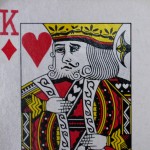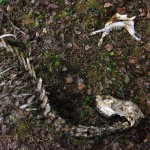This is the fourth and last episode of Forking, a short story in the ‘philosophy fiction’ genre. If you haven’t yet read Episode 1, start here.
 Roger Beethey shows up late, with a blonde. Elliot gives him a pleading look. “Relax,” says Beethey.
Roger Beethey shows up late, with a blonde. Elliot gives him a pleading look. “Relax,” says Beethey.
“You said it would be a skeleton crew,” Elliot complains, gesturing to a clump of technicians.
“It is.” Beethey nudges the blonde. “This is Sylvan. He’ll do your faces.”
The Elliots exchange glances, and stand up. “This isn’t a game,” one says angrily.
“You’re right, it’s no game,” Beethey hisses. “You chose us, a US major network, over your socialized Canadian TV, because you wanted the exposure. Well if you want our exposure, you’ve got to get us our ratings. The network doesn’t even know what it’s invested in, because of your paranoia about leaks. They’ll be watching with interest, and if I don’t come up with a professional product” – he draws a line across his throat – “I’ll have to pull your stunt right after you. Continue reading “Forking – episode 4”

 Getting into the Institute turned out to be easy. Arriving in a crowd from the bus, he found the iid-controlled gate held open for him by a smiling girl. Security at that boundary is given low priority. The ‘free-campus’ tradition. Half-hidden in a big armchair in a departmental Reading Room – not his own department’s – he checks the messages on his phone. Nothing new that matters. He re-reads Elliot’s reply to EB, agreeing to meet before class. Elliot must be in his car by now, probably in slow traffic on the Expressway.
Getting into the Institute turned out to be easy. Arriving in a crowd from the bus, he found the iid-controlled gate held open for him by a smiling girl. Security at that boundary is given low priority. The ‘free-campus’ tradition. Half-hidden in a big armchair in a departmental Reading Room – not his own department’s – he checks the messages on his phone. Nothing new that matters. He re-reads Elliot’s reply to EB, agreeing to meet before class. Elliot must be in his car by now, probably in slow traffic on the Expressway. Instead of the motel on Bridgeport, as the other Elliot wanted, he checks into the Verdmont for what remains of the night. He owes himself that much. He is a bit surprised that his iid still opens doors. The other Elliot could have changed his code, which would have made his own implant useless. But the surprise vanishes when he thinks of what he would have done in the other’s place. Without a valid iid, he could hardly last a day in Waterloo without coming to the attention of the police. He has to eat, to sleep somewhere, and although he knows that resourceful denizens of the city’s underbelly do so without an iid, he cannot. He might, of course, approach the authorities for assistance, were it not that he fears publicity just as much as the other does. As the other Elliot said last night, the stikists could ‘get mileage’ out of this. That could set the itravel industry back ten years.
Instead of the motel on Bridgeport, as the other Elliot wanted, he checks into the Verdmont for what remains of the night. He owes himself that much. He is a bit surprised that his iid still opens doors. The other Elliot could have changed his code, which would have made his own implant useless. But the surprise vanishes when he thinks of what he would have done in the other’s place. Without a valid iid, he could hardly last a day in Waterloo without coming to the attention of the police. He has to eat, to sleep somewhere, and although he knows that resourceful denizens of the city’s underbelly do so without an iid, he cannot. He might, of course, approach the authorities for assistance, were it not that he fears publicity just as much as the other does. As the other Elliot said last night, the stikists could ‘get mileage’ out of this. That could set the itravel industry back ten years. In recent weeks, I have been devouring
In recent weeks, I have been devouring  This post is an overview of the Phantom Self project, as I conceive it at the outset. It presents an overall structure of my case for conceptual reform. It does not state the entire argument, as most supporting detail will be left to subsequent posts. It is a plan and a rough map, not the journey itself, in the course of which there will certainly be unscheduled detours.
This post is an overview of the Phantom Self project, as I conceive it at the outset. It presents an overall structure of my case for conceptual reform. It does not state the entire argument, as most supporting detail will be left to subsequent posts. It is a plan and a rough map, not the journey itself, in the course of which there will certainly be unscheduled detours. An exchange of letters between Ian Brown and Jean Vanier was published in the Globe and Mail of Feb. 21, 2009, under the headline, “
An exchange of letters between Ian Brown and Jean Vanier was published in the Globe and Mail of Feb. 21, 2009, under the headline, “